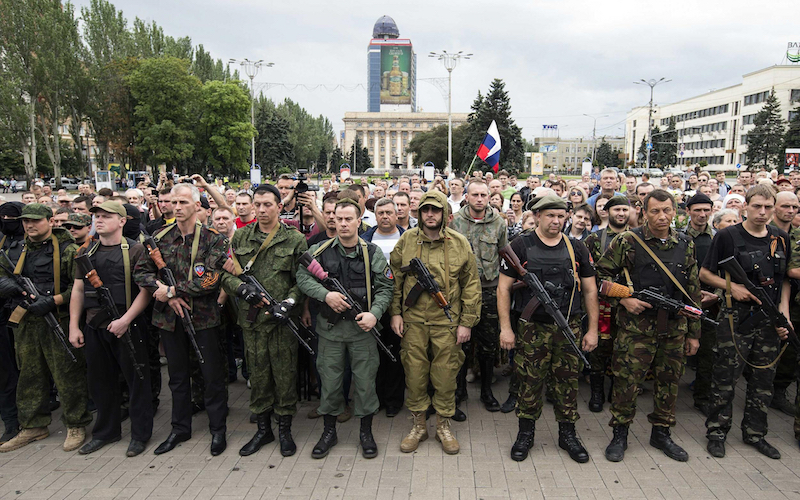
The Minsk-2 Accords: Peace in our Time? Hardly
So, a new ceasefire agreement emerges from the Minsk summit. Forgive me if I fail to applaud, especially as it allows another couple of days of mayhem before it even is meant to come into effect. The sad truth of the matter that what happened in Minsk has everything to do with optics, nothing to do with substance.
Getting Merkel, Hollande, Poroshenko and Putin together pretty much ensured that the summit had to lead to something. Had Putin simply dug in his heels and rejected every overture, then he would have been demonstrably the villain of the peace. More to the point, he would have personally snubbed Merkel and Hollande, and political credibility and amour proper would have forced them to push for a tougher line in Europe. As is, this ensured that Russia will not be on the agenda for the 12 February summit of EU leaders.
Now, though, they are at least for a few days committed to seeing this ceasefire agreement through, at least until—like the last one, let’s not forget—it is demonstrably a hollow sham.
It also puts Poroshenko into a bind. He cannot afford to alienate Europe, nor can he appear not to be able to control his own security forces, so he needs to demonstrate adherence to the terms of the ceasefire, at least at first. That includes the withdrawal of artillery no more than two days after the start of the ceasefire, as well as combat units from the front line. If the government forces do this but the rebels do not, then this opens up the scope for a one-off coup de main by the latter (Debaltseve? The Avdiivka coke plant? Mariupol?).
The terms of the ceasefire include nuts and bolts issues that are welcome and may actually be achievable, such as prisoner exchanges. They also include big picture issues that neither Poroshenko nor Putin technically ought to be able to promise.
The text includes reference to specific constitutional reforms in Ukraine, for example, something Poroshenko can’t just sign away on his own authority.
But perhaps more striking is the extent to which the fig leaf over Russia’s role is looking ever more tattered as a result of this deal. Putin, in effect, was willing to commit the rebels to such issues as troop withdrawal and even political reform. Let’s dwell on that for a moment. Putin, the president of a country that time and again claims to have no control over the rebels, is willing to redraft their political system and speak for their military deployments.
And as if that were not enough, there is the little admission in the clause on the commitment to withdraw heavy weapons to create a security zone. It talks of the need for “Pull-out of all heavy weapons by both sides to equal distance with the aim of creation of a security zone on minimum 50 kilometres apart for artillery of 100mm calibre or more, and a security zone of 70km for MLRS and 140 kilometres for MLRS Tornado-S, Uragan, Smerch, and tactical missile systems Tochka U.”
The 9A52-4 Tornado-S is an advanced Russian system, only deployed in 2012. It’s certainly not in private stocks, and Ukraine doesn’t have any. So the only way it could be involved in this war is because Russia has supplied them to the rebels—the ones they aren’t arming, remember?—or else in the hands of Russian troops. And this is a document Putin (metaphorically) signed. Maybe (and thanks to András Rácz of the Finnish Institute of International Affairs for pointing this out) this is a cautionary tale about what happens when you work too late into the night, you miss things you ought to have spotted…
But honestly the accumulation of evidence of Russia’s role in this war is such that one more contribution makes little real difference. The question is whether this deal is any more likely than the last to do more than, perhaps, quiet the guns for a little while.
This would only be the case if the positions of any of the key players—and Merkel and Hollande are not—have changed.
Poroshenko is still talking total war, while not delivering. He would like to see the war end, and at least this deal formally puts and end to talk of secession in the Donbas. However, the war has never really been about the constitutional status of south-eastern Ukraine. Instead, it has been about Moscow’s unwillingness to allow Kiev to believe itself sovereign, about Russia’s refusal to countenance the tectonic drift of Ukraine towards Europe. On this, Poroshenko shows no signs of being willing—or able—to compromise.
Likewise, nothing much seems to have changed for Putin. He still wants Kiev broken, and needs a win. Russia is hurting, though more for reasons of the oil price slump than sanctions, but it is neither down nor out. More to the point, Putin and his closest allies are still doing fine, and the Russian masses do not yet seem inclined to blame him for their current troubles. His record is of encouraging discussions, summits, accords and all the rest of the usual paraphernalia of modern diplomacy, not as a way to settle disputes but to prolong them. With one hand, he signs the communiqué, but with the other he waves on his infiltrators and arms convoys.
Besides which, we also need to be cautious as to how far Moscow truly controls Donetsk and Lugansk—and, indeed, how far they control their thuggish field commanders. At present, the locals are willing not to denounce the agreement, but they have no reason to do so, not least as if they are planning to ignore it, they hardly want to signal this, and embarrass Putin in the process. But whether they are really going, for example, to hand over control of the border to government forces remains to be seen. I hardly see them about to surrender their supply lines to Russia, which is what this would mean. In any case, that would only apply after Kiev has agreed to constitutional reform, and no one looking at the fractious parliamentary politics of Ukraine is likely to expect a quick and harmonious outcome there.
Of course, even a strategic pause may help Ukraine more than the rebels. But it may not. The irony is that at least briefly, this is likely to take the pressure off providing the government forces with more advanced US weapons, and could actually prove a step closer to freezing this conflict.
Besides which, there are many ways in which Russia and its local proxies can repudiate the ceasefire, from provoking fire from government troops to accusing Kiev of failing to observe the clause which calls for the removal of outsider, “mercenary’ troops—which would mean purging the National Guard of foreign volunteers, especially in the notoriously-autonomous ultra-nationalist units such as the Azov Battalion. I am not sure how easy this would be, even if Kiev tries to enforce it.
Of course, I could be wrong. I certainly hope so. It would be lovely to think this was the first step towards a lasting peace, and not just the next act in Russia’s unfolding exercise in creative disruption. But I won’t be holding my breath.
This article was originally posted in In Moscow’s Shadows.

